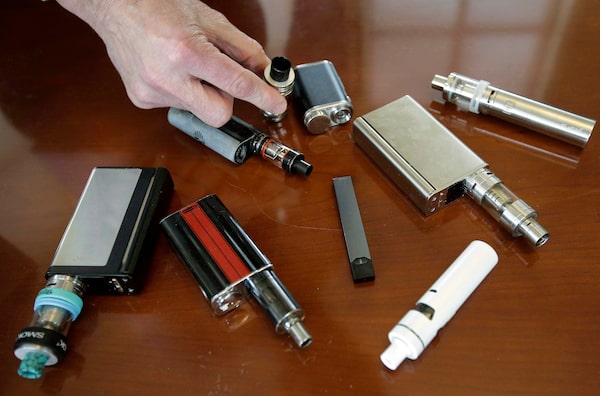
Earlier this week, the U.S. Centers for Disease Control and Prevention said it was investigating more than 150 cases of a severe lung disease in people that had used e-cigarette products in 16 different states.Steven Senne/The Canadian Press
Canada’s chief public-health officer says there are no reported cases in this country of a serious lung disease tied to vaping products that has been appearing in the U.S., but that officials are monitoring the situation closely.
Earlier this week, the U.S. Centers for Disease Control and Prevention said it was investigating more than 150 cases of a severe lung disease in people that had used e-cigarette products in 16 different states. According to the CDC, most of the cases are among adolescents and young adults who experienced a gradual onset of breathing difficulty before being hospitalized. Many of the patients reported also ingesting products containing tetrahydrocannabinol (THC), a psychoactive substance found in cannabis.
CDC officials said they don’t believe an infectious disease is causing the lung illness and that they will work to determine a cause.
Theresa Tam, Canada’s chief public-health officer, said the reports are concerning and that officials are working with the United States as the situation unfolds.
“What we’ve been doing is reaching out to our U.S. counterparts to try to understand the situation so that we can be prepared to know what to look for,” Dr. Tam said.
While there are no reported cases in Canada, Erika Penz, a respirologist based at the University of Saskatchewan, said it’s likely the severe lung disease will appear here, given how common vaping products are, particularly among young people.
Canada is “not immune to these risks,” Dr. Penz said.
Dr. Penz said she’s not surprised to hear about a severe lung disease tied to vaping products, because there is still so much unknown about the potential health effects of e-cigarettes. She said the potential exists for e-cigarettes to contain carcinogens or other contaminants and that more needs to be done to keep young people from using them.
She pointed to recent research showing a huge surge in e-cigarette use among Canadian youth. A survey of Canadian teens, published in June, showed that the number of 16- to 19-year-olds who reported vaping in the past week rose to 9.3 per cent in 2018 from 5.2 per cent in 2017. Those who reported vaping in the previous month rose to 14.6 per cent in 2018 from 8.4 per cent in 2017.
At the same time, the number of Canadian teens who reported smoking rose in 2018, marking the first increase in smoking rates in this age group in about 50 years.
“It’s a little too early to know how e-cigarettes may be linked with that change, but it certainly raises concerns that all of the gains that we’ve made with tobacco may be lost,” Dr. Penz said.
Our Morning Update and Evening Update newsletters are written by Globe editors, giving you a concise summary of the day’s most important headlines. Sign up today.
 Carly Weeks
Carly Weeks